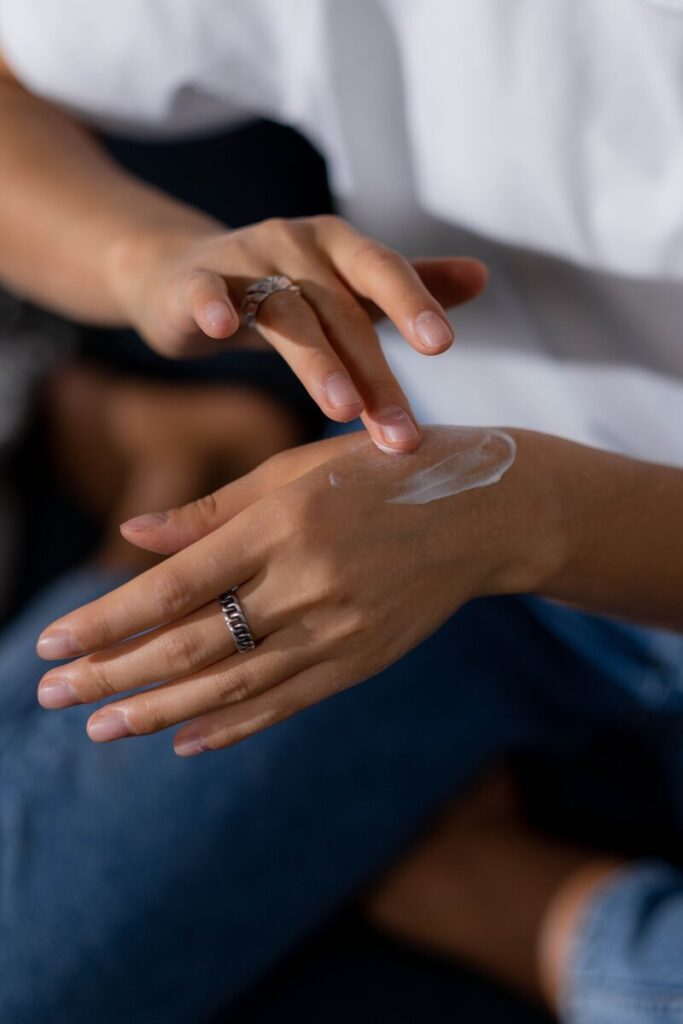We often hear people say that we need to ‘know our skin type,’ but what does this actually mean?
As dermatologists, it’s helpful to know someone’s skin type, as it allows us to recommend products and tailor a treatment regimen based on your skin’s specific needs. But first, we need to do some investigative work to determine your skin type!
Your skin type is predominantly determined by your genetics (thanks, Mom and Dad), but other factors do play a role, including hormonal changes that can happen at certain ages, the environment, as well as underlying medical conditions and overall health.
Let’s break it down.
There are basically 5 skin types out there: normal, oily, combination, dry, and sensitive. Do you know which one you are?
Normal skin: You typically have easy to care for skin, not too oily or not too dry. Moreover, normal skin tends to be versatile and can handle a wide range of skincare products without adverse reactions!
Oily: These people tend to feel like their skin is shiny shortly after washing and certainly by the end of the day. Makeup can also smudge easily, and people with this type often experience more acne due to overactive oil glands.
Dry: The individuals with dry skin experience a sensation of tightness after washing their face, particularly when a moisturizer isn’t applied immediately. They might also observe flakiness and a need for thicker, richer moisturizers to maintain hydration.
Combination: Those with combination skin have a mix of oily and dry areas. The T-zone (forehead, nose, and chin) tends to be oilier, while the cheeks can be dry! This dual nature of combination skin can be challenging when it comes to selecting products, as some products for oily skin may irritate the more dry skin.
Sensitive: If you have sensitive skin, it can react strongly to many skincare products. This might make your skin feel like it’s stinging, burning, or turning red when you use certain products. To take care of sensitive skin, it’s a good idea to use gentle, fragrance-free products.
Your skin type can change at different times in your life. As you get older, you might see your skin becoming drier and more sensitive. This happens because as we age, our skin loses some important things called collagen and elastin, which help keep it firm and hydrated. Also, your skin might act differently in different seasons. When it’s colder or drier, your skin might need extra hydration.
Your health can also affect your skin type. If you’re not getting enough of important things like zinc, niacin, vitamins A, B- complexes, C, and D, your skin might get rashes or become dry. Some medical conditions like eczema and rosacea can make your skin react more to things. Even diseases like cancer and Parkinson’s can cause rashes and dry skin.
How can you figure out your skin type? Give this simple test a try:
- Wash your face with a gentle cleanser.
- Wait for 1 hour without using any products.
- Notice how your skin feels after that hour. Is it dry, hydrated, oily, itchy, or uncomfortable?
- Take a tissue and press it on your forehead, nose, or chin. How does the tissue look?
Here’s what to look for:
- Normal Skin: Tissue has just a bit of oil, and your skin feels soft and lively.
- Oily Skin: The tissue shows grease, and your skin appears shiny.
- Dry Skin: No oil on the tissue, and your skin feels tight, dry, and might have flakes.
- Combination Skin: The tissue could be a bit greasy, but your skin feels dry on the cheeks and oily in the center.
- Sensitive Skin: No oil on the tissue, and your skin feels tight. It might have red, dry patches, and could feel raw and irritated.
This test can help you understand your skin better!
Now that you know your skin type, how do you take care of it? Well there are a few standards for all skin types which include: always remove makeup and wash your face at the end of the day. Wear sunscreen every day to protect your skin.
And then, there are specific tips for each skin type:
Normal skin: You won the skin type lottery: your skin is easy to maintain, not prone to breakouts and not sensitive to products. Stick with a gentle cleanser and be sure to wear sunscreen daily. Use a moisturizer if your skin feels dry.
Oily skin: Stick with a face wash geared toward oily skin and be sure to use non-comedogenic products to minimize clogging of your pores. Even oily skin can benefit from a moisturizer at times, but avoid oil-based products. A light, non-comedogenic sunscreen is a must.
Dry skin: Wash your face with a creamy or oil-based cleanser every day. Don’t use very hot water in your showers. After drying off, put on a thick moisturizer. For more hydration, use a creamy sunscreen with moisturizer.
Combination skin: Wash your face with a gentle cleanser. Pay special attention to the parts that tend to get dry. After cleansing, make sure to apply more moisturizer to those dry areas. This can help balance out the different needs of your skin.
Sensitive skin: Avoid hot water and use a creamy, oil based face wash. Stick with products that are fragrance free and labeled for sensitive skin. A petroleum-based moisturizer can help lock in moisture and heal a damaged skin barrier.
Ever wondered why your skin feels different as the seasons change? Or how genetics, environment, and health influence your skin journey? Tune into this week’s podcast episode ‘Do you know your skin type’ to learn everything you need to know about caring for your skin, no matter its type.
A new podcast episode drops every Monday!










